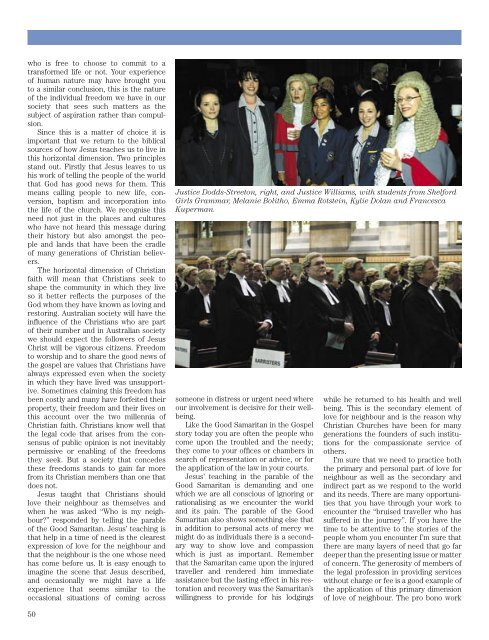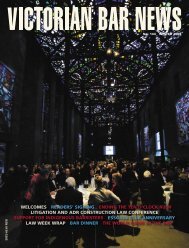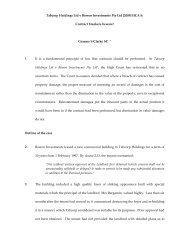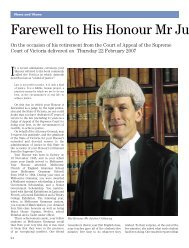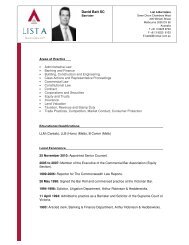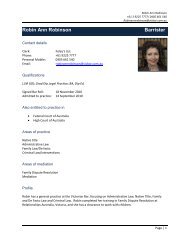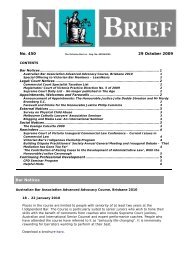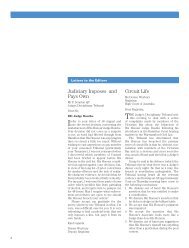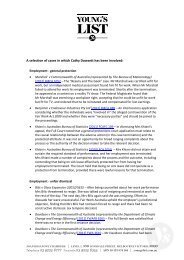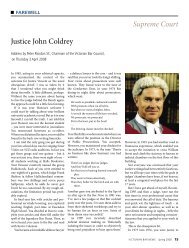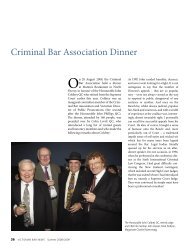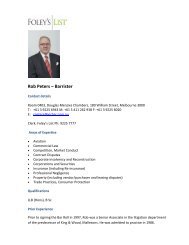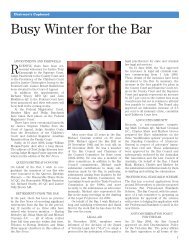Justice William Charles Crockett AO - Victorian Bar
Justice William Charles Crockett AO - Victorian Bar
Justice William Charles Crockett AO - Victorian Bar
- No tags were found...
Create successful ePaper yourself
Turn your PDF publications into a flip-book with our unique Google optimized e-Paper software.
who is free to choose to commit to atransformed life or not. Your experienceof human nature may have brought youto a similar conclusion, this is the natureof the individual freedom we have in oursociety that sees such matters as thesubject of aspiration rather than compulsion.Since this is a matter of choice it isimportant that we return to the biblicalsources of how Jesus teaches us to live inthis horizontal dimension. Two principlesstand out. Firstly that Jesus leaves to ushis work of telling the people of the worldthat God has good news for them. Thismeans calling people to new life, conversion,baptism and incorporation intothe life of the church. We recognise thisneed not just in the places and cultureswho have not heard this message duringtheir history but also amongst the peopleand lands that have been the cradleof many generations of Christian believers.The horizontal dimension of Christianfaith will mean that Christians seek toshape the community in which they liveso it better reflects the purposes of theGod whom they have known as loving andrestoring. Australian society will have theinfluence of the Christians who are partof their number and in Australian societywe should expect the followers of JesusChrist will be vigorous citizens. Freedomto worship and to share the good news ofthe gospel are values that Christians havealways expressed even when the societyin which they have lived was unsupportive.Sometimes claiming this freedom hasbeen costly and many have forfeited theirproperty, their freedom and their lives onthis account over the two millennia ofChristian faith. Christians know well thatthe legal code that arises from the consensusof public opinion is not inevitablypermissive or enabling of the freedomsthey seek. But a society that concedesthese freedoms stands to gain far morefrom its Christian members than one thatdoes not.Jesus taught that Christians shouldlove their neighbour as themselves andwhen he was asked “Who is my neighbour?”responded by telling the parableof the Good Samaritan. Jesus’ teaching isthat help in a time of need is the clearestexpression of love for the neighbour andthat the neighbour is the one whose needhas come before us. It is easy enough toimagine the scene that Jesus described,and occasionally we might have a lifeexperience that seems similar to theoccasional situations of coming across<strong>Justice</strong> Dodds-Streeton, right, and <strong>Justice</strong> <strong>William</strong>s, with students from ShelfordGirls Grammar, Melanie Bolitho, Emma Rotstein, Kylie Dolan and FrancescaKuperman.someone in distress or urgent need whereour involvement is decisive for their wellbeing.Like the Good Samaritan in the Gospelstory today you are often the people whocome upon the troubled and the needy;they come to your offices or chambers insearch of representation or advice, or forthe application of the law in your courts.Jesus’ teaching in the parable of theGood Samaritan is demanding and onewhich we are all conscious of ignoring orrationalising as we encounter the worldand its pain. The parable of the GoodSamaritan also shows something else thatin addition to personal acts of mercy wemight do as individuals there is a secondaryway to show love and compassionwhich is just as important. Rememberthat the Samaritan came upon the injuredtraveller and rendered him immediateassistance but the lasting effect in his restorationand recovery was the Samaritan’swillingness to provide for his lodgingswhile he returned to his health and wellbeing. This is the secondary element oflove for neighbour and is the reason whyChristian Churches have been for manygenerations the founders of such institutionsfor the compassionate service ofothers.I’m sure that we need to practice boththe primary and personal part of love forneighbour as well as the secondary andindirect part as we respond to the worldand its needs. There are many opportunitiesthat you have through your work toencounter the “bruised traveller who hassuffered in the journey”. If you have thetime to be attentive to the stories of thepeople whom you encounter I’m sure thatthere are many layers of need that go fardeeper than the presenting issue or matterof concern. The generosity of members ofthe legal profession in providing serviceswithout charge or fee is a good example ofthe application of this primary dimensionof love of neighbour. The pro bono work50


